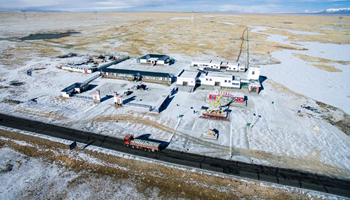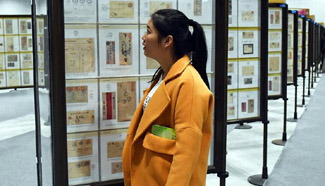by Edna Alcantara
OXKUTZCAB, Mexico, Dec. 2 (Xinhua) -- Preserving biodiversity is one of the ways to counter the consequences of global warming, anthropologist James Callaghan has said.
In an interview with Xinhua, Callaghan stressed that failure to take actions in regards of biodiversity preservation would mean the "extinction" of humanity.
"This is an urgent situation," added Callaghan, the American anthropologist and director general of the private Kaxil Kiuic Biocultural Reserve in Mexico's Yucatan Province. He made the remarks on Friday ahead of the 13th Conference of the Parties to the Convention on Biological Diversity to be held in Cancun, Mexico in Dec. 4-17.
"We only think of economic benefits and we forget to care for water and oxygen. We are part of biodiversity and not thinking it is part of our lives will mean our extinction," the scientist told Xinhua.
In his opinion, the world needs dialogues at all levels that involve civil organizations and the general public so as "to seek workable solutions for productivity and well-being."
In Callaghan's Kaxil Kiuic Biocultural Reserve, academics and researchers, backed up by the local residents, worked tirelessly to protect the 238 species in the park: 11 in amphibians, 36 reptiles, 151 birds and 40 mammals, including jaguars that were sacred to indigenous Mayans but have been on the endangered list today.
The Kaxil Kiuic Reserve, founded a decade ago, lies 100 km south of the provincial capital of Merida. Spreading across 1,462 hectares of a rainforest, it has become one of the largest private reserves in Latin America.
Animals were monitored through 24-hour cameras set all over the park. These cameras helped Callaghan and his team document the animals' activities in the reserve, a place that has become particularly important as agriculture, deforestation, hunting and livestock farming modified the jungle and threatened animals' habitats.
"It is important to protect the entire chain, not only one type of flora or fauna," said Callaghan, who is also a member of the Yucatan Center for Scientific Investigation.
Jaguars were particularly in danger. Callaghan has only detected six individuals of them in the past three years.
Different from pumas, which are more resilient to the conditions in Kaxil Kiuic, jaguars have been used to roaming over larger areas.
One of Callaghan's priorities was to crack down on hunting of endangered species. To that end, basic environmental education to enhance public awareness has been in need in local communities.
The good news was that with the help of a carbon emissions monitoring lab offered by Mexico's National Forestry Commission, Kaxil Kiuic has been able to conduct environmental impact studies to monitor and measure the CO2 emissions in the area.
The lab tracks existing carbon amount between the atmosphere and vegetation layers, in order to establish a model that could be extrapolated to similar rainforest, which have been less studied but more endangered.










